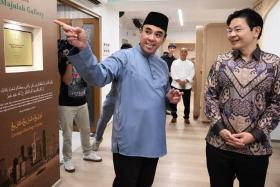9 people under 21 dealt with under ISA since 2015; trend is concerning, says Shanmugam
Nine people under the age of 21 have been dealt with under the Internal Security Act (ISA) since 2015, with six of them detained and three handed restriction orders.
Minister for Law and Home Affairs K. Shanmugam revealed the figure at the press conference following the announcement that an 18-year-old student has been detained after making plans to take part in armed violence in Singapore and abroad in support of the Islamic State in Iraq and Syria (ISIS).
Speaking at Masjid Khalid in Joo Chiat Road, Mr Shanmugam called it a concerning trend and added: “These things cannot be dealt with by laws alone. By the time the law moves, by the time you’re detained, the person has already become radicalised.”
He added: “It’s not just the Government, it’s the community and how the community comes together.”
On Wednesday, the Internal Security Department (ISD) said it had detained Muhammad Irfan Danyal Mohamad Nor in December 2022 after he had plans to stab and kill non-Muslims in dark alleys, carry out a mass-casualty attack at the Amoy Quee Camp by recruiting a suicide car bomber and construct a C4 explosive to bomb Keramat Habib Noh gravesite at Haji Muhammad Salleh Mosque in Tanjong Pagar.
In March 2021, it was reported that a 20-year-old full-time national serviceman who planned to use a knife to attack and kill Jews here, and to take up arms abroad, had been detained under the ISA.
Earlier in January 2021, it was reported that a 16-year-old Singaporean student had been detained after the authorities uncovered his plans to attack two mosques and kill worshippers in Singapore on March 15, 2021 – the second anniversary of the Christchurch terror attacks in New Zealand.
Mr Shanmugam noted that most of the young detainees have made good progress in their rehabilitation as ISD works with partners to help these young people move on and integrate them back into society.
Mr Shanmugam said: “When we pick up young people, we put a lot of focus on them because we want them to go on and fulfil their potential in life. The idea of detention is not that that’s the end, that’s hopefully a beginning and a new path.”
He added that in Irfan’s case, he will receive religious counselling and psychological and social rehabilitation. A religious counsellor from the religious rehabilitation group will counsel him and educate him on Islam. His family will also be encouraged to support him.
Mr Shanmugam said that ISD has also worked with his school to arrange for him to continue his education and sit his exams while in detention. He did not disclose which school the teenager attended.
Apart from Irfan, other people who were dealt with by ISA have been reintegrated into society, and are no longer under any kind of internal security order. They are all either employed or furthering their studies, he added.
Mr Shanmugam also said that one would expect far more people to have been radicalised, considering Singapore’s openness to external influences.
While attributing what he called a relatively small number of people being radicalised to efforts by the Ministry of Home Affairs to block websites that could lead to radicalisation as well as education efforts, he noted that the main reason for the low number is the community.
He said: “Most people in Singapore understand whatever your religion, you don’t go to support of violence. Religion teaches peace. You can live in harmony both social harmony as well as religious harmony are possible.”
Get The New Paper on your phone with the free TNP app. Download from the Apple App Store or Google Play Store now



